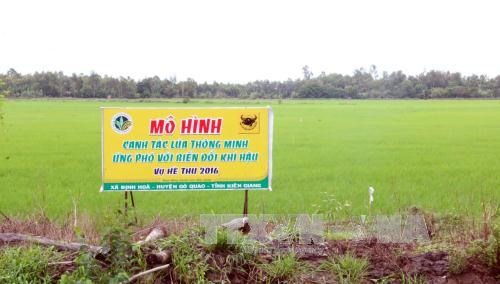 Society
Society

Experts have recommended that the Cửu Long (Mekong) Delta should expand “smart” rice cultivation to reduce production costs and increase profits.
 |
| Smart rice cultivation used in the Cửu Long (Mekong) Delta province of Kiên Giang helps farmers adapt to climate change. — VNA/VNS Photo Lê Huy Hải |
HCM CITY — Experts have recommended that the Cửu Long (Mekong) Delta should expand “smart” rice cultivation to reduce production costs and increase profits.
The delta, the country’s rice granary, began a smart-rice pilot programme for this year’s summer-autumn crop with 65 participating farmers in the delta’s 12 provinces as well as Cần Thơ City.
The farmers, who used the model on an area of 0.5 ha each, were instructed in farming techniques, including use of proper seeds and fertilisers.
They also learned how to pump water into their fields to destroy pests before sowing rice seeds.
Speaking at a seminar held in Cần Thơ on Monday (Oct 17), Mai Văn Quyền, a programme consultant and former head of the Southern Institute of Agricultural Science, said that reducing the quantity of sowing seeds was a mandatory part of the programme.
All of the farmers had reduced the quantity of seeds to 74-82 kilos per ha in the summer-autumn crop, he said. Farmers who planted rice under traditional cultivation method used 104-200 kilos of seeds per ha.
The reduction of seeds had helped farmers cut costs, reduce disease and produce better rice, Quyền said.
The quantity of fertiliser used was also less compared to traditional growing methods, while the yield of paddies was 0.5-1 tonnes higher than that of traditional cultivation methods.
Trần Văn Khởi, acting director of the National Agricultural Extension Centre, said agricultural production in the delta was facing difficulties because of drought and salt water intrusion caused by climate change.
Farmers using the model have had higher profits in the summer-autumn rice crop, according to the delta’s provincial agricultural extension centres.
Farmer Phan Thiện Khanh from Cần Thơ’s Thới Lai District said he had once used 200-250 kilos of seeds per ha but had cut back to 60 -80 kilos under the new method.
His profits rose VNĐ5 million (US$230) per ha compared to profits under the traditional cultivation method.
Đồng Văn Tiệp from Hậu Giang Province’s Long Mỹ District said he earned a profit of VNĐ22 million ($1,000) per ha by participating in the programme.
Tiệp said he would apply the smart rice cultivation model to the rest of his 2016-17 winter-spring rice crop. –VNS




